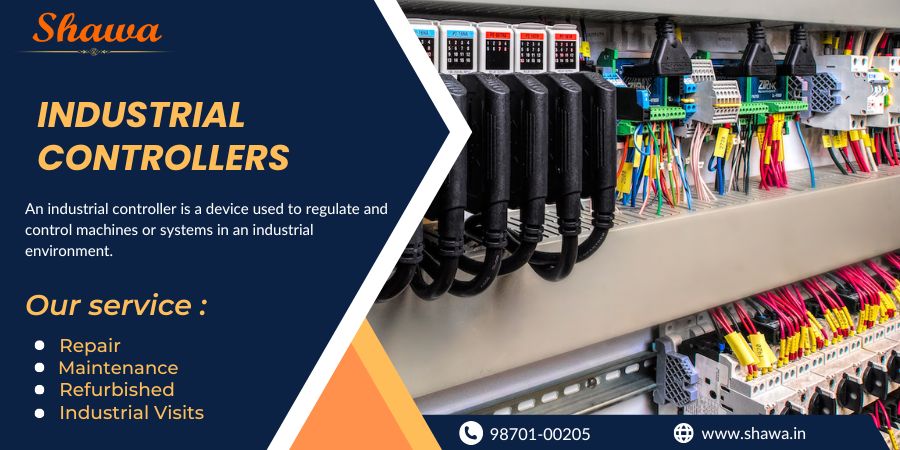
Industrial Controller Services | Repair & Refurbishment by Shawa
In the dynamic landscape of industrial automation, controllers serve as the brain behind automated processes. Whether managing a robotic assembly line or monitoring environmental controls in a pharmaceutical facility, industrial controllers ensure accuracy, efficiency, and safety. As manufacturing sectors rapidly evolve, the need for advanced, reliable, and well-maintained controllers becomes more significant.
This blog explores what industrial controllers are, their types, key features, common issues, maintenance needs, and how Shawa Technocraft plays a pivotal role in repairing and refurbishing these critical devices.
What Are Industrial Controllers?
An industrial controller is a device used to regulate and control machines or systems in an industrial environment. These devices process input from sensors and other equipment to make real-time decisions that optimize performance, ensure safety, and maintain quality.
Industrial controllers come in various forms and are integrated into different automation systems depending on the nature and scale of operations.
Key Functions of Industrial Controllers
- Monitoring machine status
- Controlling mechanical movement
- Regulating temperature, pressure, speed, etc.
- Ensuring safety compliance
- Enabling remote or local access to machine parameters
Types of Industrial Controllers
1. Programmable Logic Controllers (PLCs)
PLCs are the most commonly used industrial controllers, designed to withstand harsh environments and provide reliable operation.
- Used in: Assembly lines, conveyor systems, and manufacturing cells
- Features: High-speed processing, real-time control, ladder logic programming
2. Distributed Control Systems (DCS)
DCS are ideal for process industries where control is spread across different components.
- Used in: Oil refineries, chemical plants, power stations
- Features: Networked control, redundancy, advanced diagnostics
3. Motion Controllers
These are specialized controllers used to control movement in machinery.
- Used in: CNC machines, robotics, 3D printers
- Features: High precision, trajectory planning, real-time synchronization
4. Embedded Controllers
These are built into a larger device and programmed for specific tasks.
- Used in: Consumer electronics, medical devices
- Features: Compact, efficient, low-power
5. Temperature Controllers
- Used in: Furnaces, HVAC systems, plastic molding
- Features: PID control, sensor integration, alarm functions
Importance of Industrial Controllers in Automation
Industrial controllers play a foundational role in modern manufacturing. Their accuracy and reliability directly impact production quality, speed, and cost-efficiency.
Benefits:
- Operational Efficiency: Ensures that processes are completed with minimal waste and downtime.
- Product Quality: Consistent control leads to fewer defects and higher standards.
- Safety: Prevents dangerous operating conditions through constant monitoring and interlocking mechanisms.
- Data Logging: Captures performance data for analytics and predictive maintenance.
Common Issues with Industrial Controllers
Despite their robust design, controllers are not immune to failure. Recognizing early warning signs and addressing them promptly is crucial for minimizing downtime.
Frequent Problems:
- Firmware Corruption
- I/O Module Failures
- Communication Errors (e.g., Ethernet, Profibus)
- Overheating due to inadequate ventilation
- Power Supply Instability
- Sensor Integration Errors
Troubleshooting and Maintenance
Preventive Maintenance Tips:
- Regularly update firmware/software
- Clean internal and external components
- Monitor temperature and humidity levels
- Verify electrical connections
- Perform periodic functional tests
When to Consider Repair or Refurbishment:
- Sudden or recurring system shutdowns
- Inconsistent outputs or false alarms
- Visible signs of damage (burn marks, corrosion)
- Malfunctioning displays or controls
Controller Repair and Refurbishment Services by Shawa Technocraft
With more than 15 years of experience, Shawa Technocraft has established itself as a trusted name in the field of industrial electronics repair, especially for controllers.
Why Choose Shawa?
- ISO-Certified Facility
- Trained and Certified Engineers
- Support for Multiple Brands: Siemens, Allen-Bradley, Schneider Electric, ABB, Omron, Delta, and more
- Fast Turnaround Time
- Component-Level Diagnostics and Repair
Our Services Include:
- Repair of malfunctioning controller boards
- Re-soldering dry joints and replacing damaged components
- Firmware reinstallation and upgrades
- Heat sink and thermal paste replacement
- Functional and load testing
Step-by-Step Repair Process
- Assessment: Our technicians evaluate the incoming controller for visible and internal faults.
- Diagnostics: Using advanced tools, we run a series of tests to identify component-level issues.
- Repair: Faulty components are replaced or refurbished.
- Testing: Controllers are tested under simulated conditions to ensure real-world reliability.
- Documentation: A full report is provided, detailing the fault, solution, and service warranty.
Refurbishment vs. Replacement
In many cases, industrial facilities are faced with the decision to either refurbish or replace a faulty controller. Refurbishment by experts like Shawa can restore the module to like-new condition at a fraction of the cost of buying new.
Benefits of Refurbishment:
- Cost-effective
- Environmentally friendly
- Retains compatibility with existing systems
- Avoids extended lead times associated with new parts
Industries We Serve
Shawa Technocraft supports a broad range of industries with their controller needs:
- Automotive Manufacturing
- Textile & Paper Mills
- Pharmaceutical & Chemical Plants
- Packaging & FMCG Units
- Plastic Injection Molding
- CNC and Robotic Automation
What Sets Shawa Apart?
Real-World Testing:
We simulate industrial working conditions to ensure the repaired unit performs flawlessly under load.
Transparency and Documentation:
Our process is fully documented—from receiving the faulty unit to delivering the repaired one with a full service report.
Post-Service Support:
All repaired controllers come with a limited warranty and the option for AMC (Annual Maintenance Contracts).
Future Trends in Industrial Controllers
The role of controllers is set to become more advanced:
- Integration with IoT and Cloud Systems
- AI-Based Predictive Maintenance
- Wireless Communication and Remote Monitoring
- Edge Computing for Real-Time Analytics
Shawa Technocraft continues to invest in skill development and technology upgrades to stay ahead of these evolving trends.
Conclusion
Industrial controllers are indispensable in modern manufacturing and automation. Whether it’s ensuring product quality, enhancing safety, or streamlining operations, these devices are mission-critical.
At Shawa Technocraft, we understand the intricacies of industrial controllers and provide unmatched repair and refurbishment services to ensure your systems remain operational with minimal downtime.
Visit our service page to explore more: https://shawa.in/product-category/controller
 admin@shawa.in
admin@shawa.in  +91-9870100205
+91-9870100205 +91-9654048068
+91-9654048068


